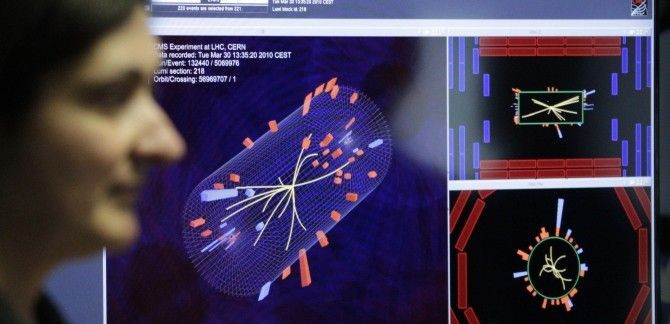Science's 2011 Watch list to focus on Large Hadron Collider, Adaptation Genes, Laser Fusion, Electric Cars

Now that the quantum machine has topped the list of Science journal's 2010 Breakthrough of the Year title, editors at the journal will be watching next year a smaller detector at the Large Hadron Collider called LHCb; new techniques that should lead to the discovery of many more genes; an ignited fusion burn; the first plug-in hybrid electric cars whose batteries are charged from a wall socket go on the market; and results from a late-stage trial of a malaria vaccine in Africa.
Here are the areas under their watch in 2011:
* Large Hadron Collider: A smaller detector at the Large Hadron Collider called LHCb, which will study familiar particles called B mesons in great detail. The particle accelarator aims to make several measurements on physics phenomena involving B mesons as an early priority. The first really interesting results from Europe's supercollider are likely to focus not on the Higgs boson or supersymmetric particles, but on the asymmetry between matter and antimatter, as seen by the LHCb detector.
* Adaptation genes: New techniques such as Restriction site Associated DNA (RAD) tag sequencing that should lead to the discovery of more genes, helping scientists learn which genes help a wide variety of organisms, ranging from bacteria to butterflies, thrive in the natural world.
* Laser fusion: The National Ignition Facility in California will make an end run in 2011 for a long-sought goal of energy research: an ignited fusion burn. Shots from the facility's 192 laser beams will pump energy into a peppercorn-sized target containing deuterium and tritium. The ensuing implosion compresses and heats the nuclei until they begin to fuse, releasing energy. If that self-heating causes a sustained fusion burn with energy gain, NIF will have finally shown that generating power from fusion is at least possible.
* Hammering viruses: Broadly neutralizing antibodies, or bNAbs, which are capable of disabling a wide range of viral variants. In 2011, researchers hope to come up with the viral pieces - the main vaccine ingredients - that trigger the immune system to make bNAbs.
* Electric cars: The first plug-in electric vehicles - including Nissan's Leaf, Chevy's Volt and Toyota's Prius - whose batteries are charged from a wall socket go on the market. These cars make a marked shift in the demands put on battery technology to take consumers where they want to go. Will consumers give up their long-distance driving range and the convenience of a quick fill-up to produce less carbon emissions? Doesn't seem like a sure bet.
* Malaria shots: Results from a late-stage trial of a malaria vaccine in Africa will be announced late in 2011. The vaccine, called RTS, S, offered roughly 50 percent protection in mid-stage studies.
© Copyright IBTimes 2024. All rights reserved.





















